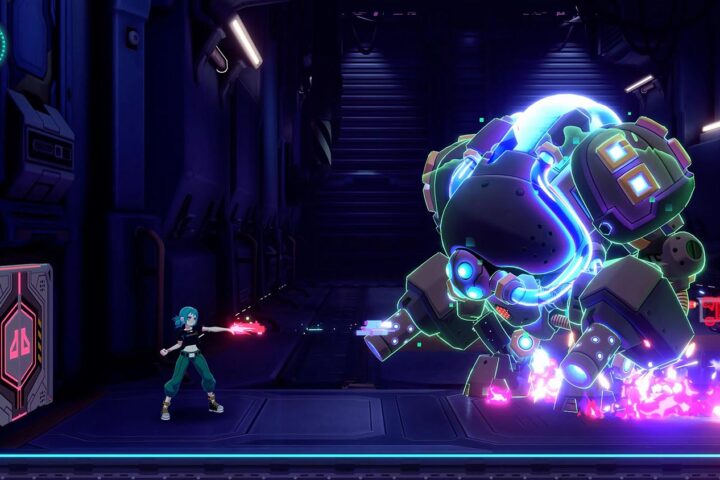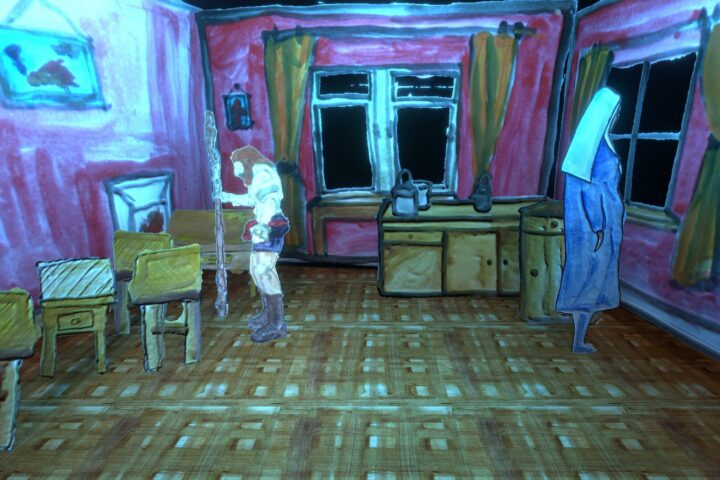Some of the NES-era recreations that appear on Mossmouth’s UFO 50 are hampered by old-school conventions, like limited lives, or by the simple fact that they don’t really have tutorials. But that’s by design, and even a badge of honor, as they’re framed as the creations of a fictional company, UFOSoft, that developed games in the 1980s.
The main unifying element here is the concept of the titular fictional console, which means many games are sequels or spinoffs. And the staggering soundtrack, as a whole, may end up as the year’s best, punching up even the most rote genre exercises. Though the creators of UFO 50 have made it clear that this is a hefty collection (“These are NOT minigames or microgames!”), the project’s scope doesn’t quite hit you until you’re looking at the main menu and 50 full-fledged games are staring back at you. That all but necessitates that any critic looking to spare their editor copy in excess 10,000 words lean into spotlighting the best of the lot.
The anxious, exasperated face of Pilot Quest’s protagonist is the first thing you see in UFO 50’s opening cutscene, and he looks worried for good reason. With his spaceship (the UFO Campanella, which takes center stage in a handful of the games in this collection) crash-landed in an alien village, he’ll have to undertake the long, arduous task of repairing it. All he has for company are characters with names like Slard, who wears sunglasses and only lets you leave town if you bribe him with meat, and Tiramisu, who mostly shares random facts.
Mechanically, Pilot Quest is a typically (for UFO 50) unusual combination of ideas, with an action RPG grafted onto a lightweight life sim, and the whole thing is filled with timers and currencies that resemble what you’d see in a modern idle game. But rather than utilizing these sticky hooks to get you to waste your time, or to extract money from you, the game only intends to lure you into an adventure that’s delightfully strange.
Even more ambitious, Mortol is a platformer in which you try to clear each stage by sacrificing player characters—generic soldiers who parachute in one at a time—to create platforms or blow up obstacles. It’s a funny, clever gag, but it also feels a bit like a gimmick and it quickly wears thin. So Mortol II comes along to prove the concept has potential indeed.
Instead of levels, the sequel takes place in one large map that’s closer to something you might see in a Metroid game. Over the course of a hundred attempts, you’ll choose one of five characters to permanently kill enemies, find keys, or unlock doors, while using their unique sacrifice abilities, like turning to stone or building a pipe that functions as a shortcut. Five music tracks (one per character) lend a surprisingly dramatic tone to a sequel that feels like an epic war of attrition and nothing else you’ve ever played, including the first Mortol.
While Bushido Ball is a more obvious genre mashup than most of UFO 50’s standouts, it’s also in the running for the most fun entry here. The Pong-inspired sports game has a fighting game twist that sees you choosing from a roster of samurai with various strengths, weaknesses, and special moves for a sharp, quick duel. The single player mode shines more than anticipated, requiring you to defeat each of the game’s fighters in a grueling gauntlet. Considering how immediate it is, there’s reason to think this could be an instant couch PvP classic.
Lords of Diskonia is one of a handful of games in the collection that bears the influence of board game designer Jon Perry (of the excellent Air Land and Sea and Spots), who’s one of the six designers credited on UFO 50. It’s a turn-based strategy game that spans 10 scenarios, each of which has you sparring with an opposing army over the course of multiple battles, all while collecting funds and hiring units into your ranks. The twist is that these battles play out like a tabletop dexterity game, a la Catacombs and Crokinole, with each unit represented as a disk that players fling at enemies in order to deal damage. It’s a simple tweak to genre standards, but it makes this chewy, slow-burn strategy game feel fresh throughout.
Waldorf’s Journey takes place in a Walrus’s dream, and it lives up to everything that idea promises. Mechanically, it’s a platformer, but it’s much more tense and awkward than that label implies. Rather than an exercise in momentum or reflexes, Waldorf’s Journey is a test of your precision, guts, and at times pure luck, as your primary mode of movement is slingshotting yourself into the air at just the right angle and velocity to jump from platform to tiny platform.
You’ll occasionally come across signs bearing dreamlike musings: “the sea shells form a bridge between us,” “there is a dark shape on the horizon,” and so on. As you travel further, the wind changes direction and the evening sky shifts from orange to purple. Platforms get sparser and require leaps of faith or hope. And when you inevitably miss and Waldorf falls into the sea, he wakes up on an ice floe, surrounded by sleeping walruses, waiting to dream again. It’s the clearest example of UFO 50’s willingness to experiment paying off in something as fun to play as it is interesting conceptually, but in a crowded field, it’s far from the only one.
This game was reviewed with a key provided by Mossmouth.
Since 2001, we've brought you uncompromising, candid takes on the world of film, music, television, video games, theater, and more. Independently owned and operated publications like Slant have been hit hard in recent years, but we’re committed to keeping our content free and accessible—meaning no paywalls or fees.
If you like what we do, please consider subscribing to our Patreon or making a donation.






